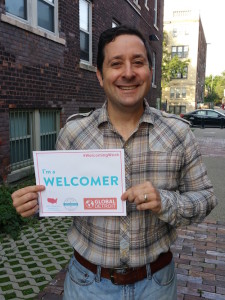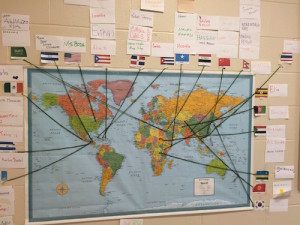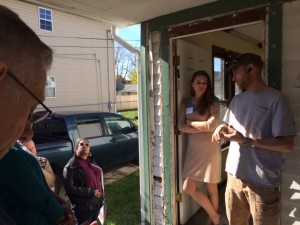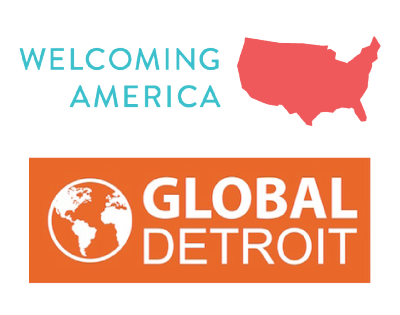BDC Internships: Breaking Down the Barriers to Refugee Employment
/in All Blogs, Immigrant Retention, Diversity, Refugee Resettlement /by gglnadminDetroit: Immigrant and Refugee Neighbors Wanted
/in All Blogs, Immigrant Retention, Diversity, Refugee Resettlement /by gglnadminBy Sloan Herrick, Deputy Director, Global Detroit
As I am writing this, just a couple of week after the terrorist attacks in Paris and Beirut and amid the ongoing crisis in the Middle East, I can’t help but reflect on how vital it is right now to share across cities, cultures, and countries creative solutions for integration and inclusion–for both refugees and receiving communities. These values must drive our work to restore our cities. To this end, earlier this month, WE Global Network member Global Detroit and a delegation of over 20 Metro Detroit partners visited their Rust Belt neighbors in Cleveland, Ohio to learn about how Cleveland is designing and implementing strategies to integrate and include refugees in the social and economic fabric of their community, so that they can use these insights in Metro Detroit.
As a national leader in immigrant economic development and a founding member of the WE Global Network, Global Detroit often draws from the talent and expertise of others across the Midwest that are leading the way in inventive and unconventional strategies to foster community and economic development. The study tour included a diverse delegation of Southeast Michigan leaders and national partner Welcoming America and was hosted by new partners made through the WE Global Network.
On our tour, the group visited Thomas Jefferson International Newcomers Academy. This newly-constructed school in a developing neighborhood — not dissimilar to many Detroit neighborhoods and other Rust Belt cities’ neighborhoods — is unique because it services all of the English Language Learner (ELL) students in the Cleveland Public Schools. Nearly all of these students, who make up 25 nationalities and speak a total of 22 languages, have been in the U.S. for less than two years. At the Academy, the delegation was inspired by students from China, Puerto Rico, Mexico, Afghanistan, and other parts of the world who, in addition to the regular curriculum and the trials and tribulations of growing up, are learning a brand new language, far from home.
Thomas Jefferson International Newcomers Academy is the anchor of Cleveland’s Dream Neighborhood – which is defined by the half-mile radius that surrounds the school. Cleveland Councilman Joe Cimperman, along with Councilmen Brian Cummins and Matthew Zone, have committed to revitalizing this neighborhood and providing new opportunities for refugees in Cleveland. They have prioritized demolition funding for the Dream Neighborhood (which encompasses 162 vacant properties), and the Cuyahoga County Land Bank has used data to identify target properties in the foreclosure process to assist in neighborhood planning and housing redevelopment. To date, this partnership has resulted in the demolition of 15 properties in Dream Neighborhood – a strong start to a brighter future in this community.
This relationship between the Cuyahoga Land Bank and municipal government is underpinned by the important role that a private developer plays in the Dream Neighborhood by purchasing, rehabbing, and renting formerly vacant homes. He also employs refugees in construction jobs to teach them valuable skills that can be translated to other jobs in the workforce. Once the houses are restored, they are rented to refugees to provide quality, affordable, safe places to live.
In addition to the work done in Dream Neighborhood, Cuyahoga County Land Bank is partnering with refugee serving agencies to develop refugee housing and identify refugee tenants and homeowners who often struggle due to lack of credit and rental history. The Land Bank has worked with the International Services Center (ISC) to sell 7 single-family homes that were rehabbed into new homes for refugees.
With what is estimated to be over 20,000 vacant properties in Detroit, we find ourselves sitting on an untapped opportunity to create new pathways that connect immigrants and refugees in search of housing with these vacant homes.
In the second half of our study tour, attendees sat down with members of the Refugee Services Collaborative — a cross-sector of organizations joined together to better serve refugees settling in northeast Ohio. Formed in 2011, the innovative collaborative coordinates the work of its members and builds capacity across the organizations; it is comprised of refugee resettlement agencies, area school systems, and community and faith-based organizations. While not a unique concept, members point to the inclusion of a broad group of entities and the level of collaboration, and the hiring of a third party facilitator as reasons for their success. In 2012 the Collaborative published a groundbreaking economic impact study of refugee resettlement in Northeast Ohio, which found that refugees have helped slow population loss and have had an economic impact of $48 million. An economic development approach to their resettlement efforts has further propelled their work and opened doors to new relationships, sectors, and strategies.
In the wake of the attacks on Paris and Beirut, Global Detroit and its friends and partners in the WE Global Network continue to develop comprehensive and streamlined systems to receive, include, and empower more refugees. The study tour to Cleveland left the Global Detroit team and its partners with a strong sense of direction, inspiration, and partnership to navigate refugee resettlement in Detroit and the region. The delegation will be applying the tools in Detroit to develop innovations that integrate and include refugees and immigrants as valued contributors to Southeast Michigan’s cultural, civic, and social fabric.
Global Detroit thanks its friends and generous hosts – including, Samantha Peddicord of Cleveland City Council Representative Joseph Cimperman’s office, Gus Frangos and Lilah Zautner of the Cuyahoga Land Bank, Danielle Drake of US Together, Darren Hamm of Refugee Response, and Richard Konisiewicz of Global Cleveland – who made the trip to Cleveland a huge success!
This modified post originally appeared at GlobalDetroit.com
Welcoming Week: A Reflection on America’s “Golden Door”
/in All Blogs, Welcoming Week, Refugee Resettlement /by gglnadmin
Steve Tobocman is a Welcomer! Snap a photo with the I Am a Welcomer sign and post it to social media with the hashtags #AmericaWelcomes and #WelcomingWeek. Click Steve’s photo to get the sign and find other ways to take action.
As the grandson of Jewish grandparents who fled Poland in the early 20th Century only to have all of their remaining family perish in the Holocaust, I grew up with a strong belief in the United State as the world’s haven for those fleeing persecution, oppression, and tyranny. I remember learning the powerful words of Emma Lazarus that are inscribed on the pedestal of the Statue of Liberty during my temple’s Sunday School classes:
From her beacon-hand glows world-wide welcome . . . ‘Give me your tired, your poor, your huddled masses yearning to breathe free, the wretched refuse of your teeming shore. Send these, the homeless, tempest-tost to me, I lift my lamp beside the golden door!’
The gripping pictures of a lifeless Syrian boy—approximately the same age and dress as my own two-year-old son Adiv—on a Turkish shore last week is enough to shock even the busiest American parent. Considering that the UN High Commission on Refugees has now registered over 4 million Syrian refugees and some 2,500 refugees have perished at sea trying to escape the conflict, the humanitarian issues facing the current crisis are truly catastrophic.
This week marks the fourth annual National Welcoming Week, during which communities all across America will celebrate the nation’s welcoming nature and the contributions that immigrants and refugees have made to our communities. The week’s events bring immigrants and refugees together with their neighbors in a spirit of unity.
Given the gripping headlines about the Syrian refugee crisis, this year’s Welcoming Week should provide ample opportunity for Americans to reflect on how our region could play a pivotal role in responding to the crisis and how our response would impact our local communities. This past May, the New York Times ran an editorial entitled “Let Syrians Settle Detroit,” noting that Metro Detroit’s “vibrant and successful” Arab-American community could help make our region more welcoming than others for resettling Syrians. Specifically, the editorial commented that, “From its original Native Americans to the Great Migration of Southern blacks to the infusion of Hispanic and Arab immigrants, Detroit has been a melting pot of religions, ethnicities and cultures.” Welcoming can be the difference maker in successful refugee resettlement and integration.
The reality is that refugee resettlement in communities across the nation would provide specific and tangible economic benefits to the local communities that serve as the new home for suffering families. A recent economic impact study on refugee resettlement efforts in Greater Cleveland concluded that the resettlement of some 4,500 refugees from 2000-2012 in the Cleveland metro area created $48 million in economic activity and 650 jobs in 2012 alone.
German Chancellor Angela Merkel has grabbed international headlines and praise for her leadership in pledging to accept as many as 800,000 Syrian refugees in the coming year. In addition to the deep humanitarian significance for Germany to define itself as a safe harbor for refugees, observers have been quick and correct to point out that her actions are motivated also by economic self-interest. With declining birth rates and a rapidly-aging workforce—conditions that plague Detroit, Cleveland, the Midwest, and many American communities—Syrian refugees represent an opportunity to inject new labor and energy into Germany’s economy. Merkel is planning for Germany’s long-term economic prosperity.
Midwesterners and Americans need to look no farther than the Minneapolis/St. Paul region to realize that serving as a hub for refugee resettlement can strengthen our economy and secure our long-term prosperity. Home to tens of thousands of Hmong, Somali, Vietnamese and other ethnic residents—most of whom can trace refugee resettlement histories as part of their community’s migration story—the Twin Cities possesses one of the fastest-growing economies and highest per capita incomes in the Midwest.
No doubt there are complex geo-political issues that need to be carefully considered in resolving the Syrian, other Middle Eastern, and African refugee crises, but one aspect that should not be in dispute is the local economic benefits to economies like Metro Detroit, Cleveland, Minneapolis/St. Paul, and Germany. Refugees bring new energy, resourcefulness, and an eagerness to pursue freedom and opportunity. It’s the same recipe that brought my grandparents to Detroit and millions of others’ families to America.
This Welcoming Week let us celebrate those contributions and resolve to welcome the world’s newest “tempest-tost.”




